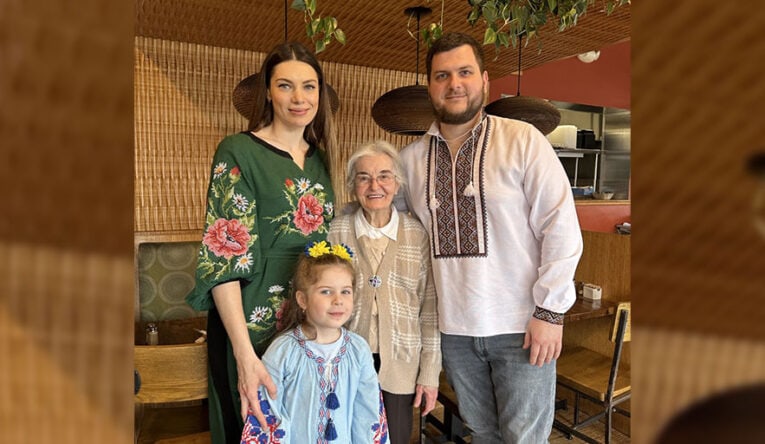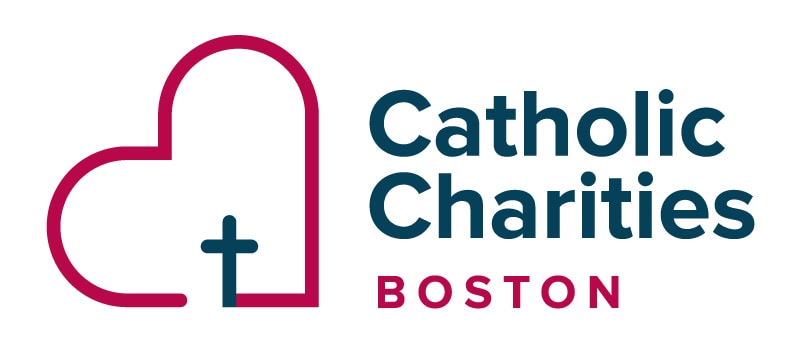‘I’d Never Felt this Feeling Before – When People Help You for No Reason at All:’ Ukrainian Refugee Shares His Family’s Experience in Catholic Charities Welcome Circle

“At first, we thought the war would only last two to three months. That’s what everybody hoped for.”
Nazar is one of 2,000 Ukrainians who have fled to Massachusetts since the Russian invasion against Ukraine began in February 2022. Nazar, his wife, and their five-year-old daughter made the difficult decision to leave in September 2022.
“We thought, ‘come on, this is the 21st century’. But it just kept going and going. It’s been very hard.” said Nazar.
Upon arriving in Boston several days later, the family was advised to contact a woman named Joan Horgan, a volunteer running Catholic Charities Boston’s HOPE Welcome Circle in Belmont and Watertown.
Since that day, Joan and Nazar have been in touch nearly every day. “She’s like a second mother to me,” Nazar said.
Catholic Charities Boston is one of six agencies nationwide participating in Welcome Circles for Ukrainians, a pilot program developed by the United States Conference of Catholic Bishop’s (USCCB) Migration and Refugee Services in which volunteers from parishes, communities of faith, or organizations who are willing to provide financial support, guidance, and community connections join to help Ukrainian families resettle in Massachusetts.
Since launching the program, Catholic Charities Boston has organized 14 Welcome Circles, with an additional 9 in formation, collectively helping to resettle 32 Ukrainians and counting. Given the program’s quick success, Catholic Charities Boston has now expanded it to also serve Haitian parolees resettling in the area.
Having volunteered with Catholic Charities Boston’s refugee clients for many years as a member of her parish collaborative’s social justice committee, and being an immigrant herself from Ireland, Joan said when the war broke out in Ukraine, she immediately felt called to help.
The challenges Joan faced as an immigrant arriving in the U.S. drive her to help families like Nazar’s in every way she can. After meeting him, she quickly set to securing beds, furniture, and household items for his family’s new apartment.
While Nazar and his wife searched for employment, Joan helped enroll their daughter in a local preschool, ensuring that she had opportunities to socialize, learn, and play with other children her age.
Nazar said when he dropped her off on her first day of school, he was worried that she would struggle, having never been away from her parents and knowing no English. All day, he waited to get a call from the teachers. When the school day ended, and he arrived to pick her up, Nazar said his daughter didn’t want to leave; she was having too much fun with her new friends.
“It’s pretty awesome to see,” Nazar said. “She already has learned some English. Sometimes when she speaks, I hear a Boston accent.”
While Nazar’s daughter is at school, his wife works at a department store, while he balances several day jobs – working in food delivery, as a part-time handyman, and remotely managing an auto-motive business he ran in Ukraine. Before moving to the U.S., Nazar worked as an information technology specialist and hopes to secure a job in the field in Boston as soon as he can.
“I try to hustle. I need to feed my family, and I won’t forget about Ukraine. I try to help my friends as much as possible,” said Nazar.
Like Joan, Nazar was raised to put others first. Even before moving to the U.S., Nazar was doing everything he could to help other Ukrainians in need in the midst of trying to protect his own family––serving brunch to homeless Ukrainians on Sundays, volunteering to support children who had lost their parents to the war, and donating funding and cars, through his business, to the Ukrainian army.
“Everyone has to do what they can,” he said. “I have to do my part in helping.”
Nazar said he is continually stunned and motivated by the kindness he and his family have received from Joan and the other members of his Welcome Circle, whether it’s ensuring his family has their basic needs met each week, connecting them to local resources in the community, or sending a simple text checking in.
“I’d never felt this feeling before – when people help you for no reason at all – just because they want to help,” said Nazar. “It touches my heart.”
Sign up for our mailing list to receive stories and updates about the mission and impact of Catholic Charities Boston and learn more about upcoming events and volunteer opportunities.
"*" indicates required fields
